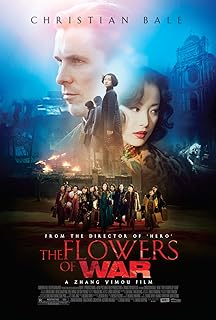電影訊息
電影評論更多影評

2012-01-04 19:46:48
A Shady American in the Nanjing Massacre (ZT)
"該片的三個嚴重侷限:其一,《金》嚴重缺失對南京大屠殺的歷史揭示和反思,不能讓觀眾意識到為什麼這是一場血腥醜惡的「災難」;其二,張藝謀在電影中表現了完全違背歷史真實和電影的現實性原則的「電影魔術師」的作風,將根本不可能出現的情景,肆意安置在電影中,像肥皂劇的惡作一樣;其三,為了表現全球化,尤其是為了向美國觀眾和影評人討好,設置的「美國混混變英雄」的男主角約翰是一個虛假而無生命的角色,奧斯卡明星Christian Bale完全是承擔了「一個錯誤的角色」。"
THE NEW YORK TIMES
The Flowers of War
A Shady American in the Nanjing Massacre
By MIKE HALE
Published: December 20, 2011
Eventually, it seems, every senseless waste of life gets its own gauzy tear-jerker. That’s about the only way to justify 「The Flowers of War,」 in which the veteran Chinese director Zhang Yimou revisits the Nanjing massacre of 1937 by making something resembling a backstage musical, with breaks for the occasional ghastly murder or rape.
There’s nothing that says the atrocity blockbuster has to be a disaster in its own right; films like 「Gone With the Wind」 and 「Gallipoli」 have their good points. But long before its two and a half hours are up, 「The Flowers of War」 is sunk by the disproportion between the events being portrayed and Mr. Zhang’s distanced, strangely frivolous treatment of them — in essence, his refusal to take a point of view on one of the most gruesome chapters in Chinese history.
「Flowers」 has received bountiful publicity for being expensive, state-approved and Oscar-submitted, buzz that got louder last week when the film’s British star, Christian Bale, was forcibly prevented from visiting a Chinese activist lawyer being held under house arrest.
But fears that Mr. Zhang would take a one-dimensional, patriotic approach to the Japanese invasion and occupation of Nanjing (formerly Nanking), while not entirely unfounded, are misplaced. Other recent Chinese films have displayed more sentimental nationalism, jingoism and demonization of the Japanese enemy.
His real approach to the events of 1937 is to use them as a backdrop for the kind of deluxe, Hollywood-inspired melodrama that has made him an art-house favorite. In the process he fails to deliver on most of the elements — grandeur, historical sweep, genuine pathos — that would have made the film worthwhile.
Given the right story, as in 「Raise the Red Lantern」 or 「House of the Flying Daggers,」 Mr. Zhang’s almost clinical attention to pretty surfaces and soap-opera mechanics can have entertaining results. In 「Flowers,」 though, you can feel him at war with his material, never settling on a tone or a compelling or even coherent narrative. (The screenplay is by Liu Heng and Geling Yan, based on a novel by Ms. Yan.)
Mr. Zhang’s distance from the larger story of the massacre is embodied in his decision to set most of the film within the compound of a fictional European church. The result is an artificial, back-lot atmosphere; the opening scenes, set in the streets, take place in an actual fog of war, with smoke (and at one point the dust from a large mound of flour) isolating the characters from the real world of Nanjing.
Mr. Bale plays John Miller, a disreputable American vagabond who happens to be a mortician; as the film begins he is making his way through the fighting toward the church, where he is to be paid to conduct a burial. Also on the move are two groups of a dozen or so young women, the flowers of the title. They are, as a matter of production design if not credible history, visually coded: convent students in severe blue jackets and prostitutes in seductive, rainbow-hued silken dresses.
All of these parties take refuge in the church, with Miller, who dons the robes of a dead priest, bridging the Manichaean divide between the suspicious students upstairs and the contemptuous, defensive prostitutes hiding in the basement. (They quickly transform their cellar into a seraglio; you can practically smell the perfume.) It’s a contrived, hothouse state of affairs, summed up in a scene Mr. Zhang likes so much that he repeats it: the laughing prostitutes sashaying across the churchyard in slow motion, oblivious to the impending tragedy.
There will be tragedy, of course, though when it comes it takes a weirdly oblique form. One group eventually performs what appears to be an ultimate sacrifice, full of sexual and social overtones, but this happens off-camera, if it happens at all. The coyness can be explained, perhaps, in terms of the film’s structure — the story is narrated by one of the students, and what we see may correspond to her selective, romanticized memories — but it cannot really be excused.
On-screen, meanwhile, the camera ventures into the outside world in occasional scenes that seem timed to goose the action and remind us that we』re watching a war movie. In one of Mr. Zhang’s few outright concessions to the notion of Chinese supremacism, a lone officer (Tong Dawai) draws a contingent of Japanese soldiers away from the church in an act of hyperbolic heroism. Later, in a surrender to gross sentimentality, two prostitutes leave the church on the sort of insane mercy mission that happens only in movies, with particularly disturbing consequences. Aside from that sequence Mr. Zhang is restrained in his depictions of Japanese brutality, which mostly take the form of threats and intimidation.
Mr. Bale, turning in a respectable if oddly chipper performance under the circumstances, has the unfortunate task of playing a character who doesn』t really add up. Miller’s conversion from opportunist to savior may be another stock element of this sort of movie, but the scene meant to showcase his transformation is rushed and ineffective. Having made an American the central figure in his film, Mr. Zhang reduces him to wrangling flocks of nubile women, like Cary Grant in a much more violent 「Father Goose.」
「The Flowers of War」 suffers greatly in comparison to several far superior, less hyped movies about the Nanjing massacre, including the harrowing drama 「City of Life and Death,」 directed by Lu Chuan, and the documentary 「Nanking,」 by Bill Guttentag and Dan Sturman. Those filmmakers came armed with points of view. Mr. Zhang, retreating into the mists of old movies, has declined to take the field.
「The Flowers of War」 is rated R (Under 17 requires accompanying parent or adult guardian). War violence and sexual assault. 舉報
評論

